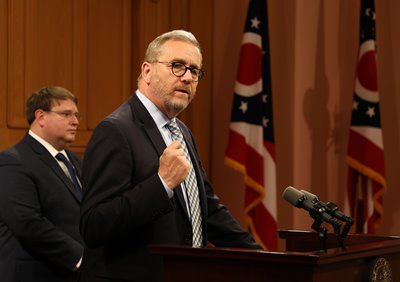
Editor’s note:
Because of the overwhelmingly positive response to this editorial written by Attorney General Dave Yost and published by the The Vindicator
, On the Job is reprinting it here.
I
wish Julia Roberts and Richard Gere had never made “Pretty Woman.”
That movie, a Cinderella story about a prostitute who finds love and a good man in the course of her working life, begs a question: Why should society tell two adults that one cannot pay the other for sex? Why should the government be able to set rules about what happens in private in a bedroom, or a hotel room?
The answer lies in the shadows of American society, among the unnoticed lives of the slaves.
Yes, slaves. Women — sometimes men, sometimes boys, but mostly women — are “groomed” by older men who wish to sell them as sex slaves. These slave masters look for vulnerable girls they can exploit, usually in their early to mid-teens, who are often already marginalized or traumatized by their own childhood experiences.
Enticing them at first — with attention, kindness, money, food, clothing — these modern slave masters eventually introduce the girls to addictive drugs, and use their dependency or an outright threat of violence to coerce them into selling themselves for sex.
The slave master gets the money, of course — they call the women “ATMs.” The women get to keep their addiction. This is what human trafficking looks like. It was conspicuously absent in “Pretty Woman” — Julia Roberts’ character may have been the master of her own fate, but she is far and away the exception, not the rule.
Not all prostitution is human trafficking, of course. What turns the selling of sex into human trafficking in persons is whether the money stays with the seller or her slave master. But as it turns out, that difference isn’t a good basis to distinguish the crimes.
Here is the rub: The buyer of sex doesn’t know whether she keeps the money or not. When a man — it almost always is a man — asks for a sex act in exchange for money, he has no idea whether the “yes” he gets is real.
The seller of the sex act might be a free spirit, making a deliberate, rational decision to get money.
But the seller’s “yes” probably is not real. Usually it’s “yes” because the slave master is waiting in his car outside in the parking lot, with a dose of heroin, a baseball bat or a knife.
You will never know.
A key idea in our system of criminal justice is notice: that you must be able to know that you’re committing the prohibited act. But there’s no way to know if the thing you’re doing is a minor crime — prostitution — or the major crime of human trafficking.
When we’re talking about slavery, “I didn’t know” isn’t even an excuse. It’s an admission — an admission you took the risk that you were having sex without consent, the risk that your money was helping to keep another human being in slavery, no better than property. That’s why prostitution should not only remain illegal; it’s why we should up the ante on the buying of sex.
Currently, the buying and selling of sex are the same crime — a low-level misdemeanor — in spite of the fact that many women who are convicted of selling sex are doing so because they are forced into it, and are victims themselves.
The buyers of sex are never forced into it, and are never victims. They are sating their own appetites at the expense of another human being, predators who take what they want without regard to the costs of their feeding. Without their money, there is no market for sex; without a market, there is no human trafficking.
This fall, I will ask the General Assembly to split the buying and selling of sex into separate offenses, with buying being the more serious crime.
Slavery is a deep evil that we thought we had slain 140 years ago. It warrants a bright-line prohibition. Even if there is a Julia Roberts out there somewhere selling herself because she wants to, there are so many others enslaved that society can and should draw a bright line that says “no.” Julia and Richard will have to find each other without money changing hands.
Yours,
Dave Yost